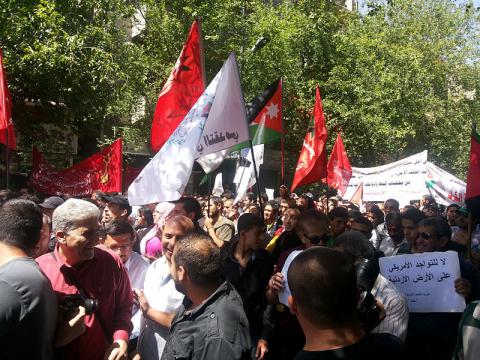
Ahead of Jordan’s fifth periodic review on October 19 and 20, 2017, Alkarama submitted its shadow report to the UN Human Rights Committee (HR Committee) on September 18, evaluating the situation of civil and political rights in the country.
During the session, the Committee's experts will assess the implementation of the International Convention on Civil and Political Rights (ICCPR) - ratified by Jordan in 1975 - on the basis of the State report as well as information provided by NGOs, including Alkarama.
The practice of torture by Jordanian authorities
Since Jordan's last review by the Human Rights Committee in 2010, the Jordanian Penal Code was amended to bring it into line with the Convention against Torture (UNCAT). Nevertheless, torture is still considered only a misdemeanour under Jordanian law unless it results in serious injuries, implying that punishment is often not commensurate with the gravity of the acts.
Moreover, acts of torture remain unpunished due to both a lack of efficient complaint mechanisms and the absence of prosecution of perpetrators. Cases of torture involving members of the Public Security Directorate (PSD) and the General Intelligence Directorate (GID) continue to be handled by special courts, namely the Police Court and GID military courts, whose proceedings are neither independent nor transparent.
Human rights violations and counterterrorism
Alkarama’s report denounces human rights abuses committed under the pretext of the fight against terrorism, which tend to follow a similar pattern. The GID – the country’s intelligence agency which reports directly to the king – arbitrarily arrests and detains individuals, even those merely exercising their fundamental rights to freedom of opinion, expression, and peaceful assembly.
After several weeks of incommunicado detention, during which time they are severely tortured to extract confessions, these individuals are brought before the prosecutor of the State Security Court (SSC), who sits at the GID premises. During highly unfair trials before the SSC, self-incriminating statements are admitted as the sole source of evidence.
In numerous cases, peaceful activists and dissenting voices have been detained by the GID and prosecuted before the SSC for allegedly disturbing either “the public order” or “relations with a foreign state.” The latter charge was used against Amjad Qourshah, a 48-year-old assistant professor in comparative religion at the University of Jordan and a well-known TV and radio presenter.
On June 13, 2016, Qourshah was arrested for having posted a video online two years previously which criticised the participation of Jordan in the international coalition led by the USA against the Islamic State (IS). He was released after almost three months of detention without due process.
Similarly, Eyad Qunaibi was detained for a year for “incitement against the political regime.” On June 15, 2015, Dr Qunaibi had posted an article on Facebook criticising, among other things, Jordan’s ties with Israel. As a result, he was arrested by the GID and sentenced to two years in prison on December 7, 2015. Alkarama denounced in its report the restrictive and vague anti-terrorism legislation used to repress free speech.
Restrictions on freedom of expression, association and assembly
Alkarama’s shadow report also highlighted the numerous restrictions on the freedoms of expression, association, and assembly in Jordan. One such example in Jordanian law is the criminalisation of speech deemed critical of the king, government officials, and institutions, as well as foreign countries.
Additionally, in 2012 the Press Law was amended to regulate electronic publications, imposing restrictions on online news content and requiring news websites to register and obtain licenses to operate from the Media Commission, which itself falls under the jurisdiction of the Council of Ministers. In practice, this licencing system is used to curtail online freedom of information.
Furthermore, in the wake of the Arab Spring, Jordan experienced a surge in peaceful demonstrations, to which the king responded with limited concessions, such as the amendment of the Public Gatherings Law. Since then, Jordanians no longer require government permission to hold public meetings or demonstrations. However, in practice, the authorities actively circumvent the decriminalisation of peaceful assembly by resorting to anti-terrorism legislation and trying protesters before the SSC.
Lastly, freedom of association remains limited. In March 2016, the Social Development Ministry proposed further amendments to the restrictive 2009 Law on Societies, which places excessive restrictions on the establishment of civil society groups and grants the government legal authority to dismantle organisations under the guise of them having “disrupted the public order.”
Comprehensive National Plan for Human Rights: a beacon of hope?
Despite numerous setbacks on human rights since the Arab Spring, in March 2016, Jordan launched the Comprehensive National Plan for Human Rights, a 10-year initiative that calls for numerous changes to legislation, policy, and practice. In this context, the king established the Royal Committee for Developing the Judiciary and Enhancing the Rule of Law, which presented its report in February 2017.
The report included a set of positive recommendations to improve the judiciary and criminal justice system, including a proposal to guarantee all suspects the right to access a lawyer from the time of arrest as well as during interrogations. However, no recommendations were made in relation to the intelligence services, which are responsible for the most serious violations in the country.
For more information or an interview, please contact media@alkarama.org (Dir: +41 22 734 1008).
